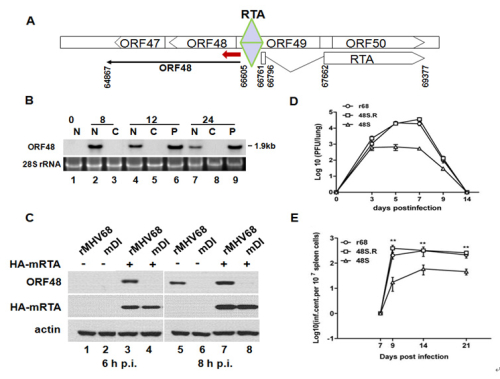MHV-68 ORF48 is activated by RTA and important for viral replication
Herpesvirus lytic genes are expressed in a regulated, cascade fashion. Replication and Transcription Activator (RTA) serves as a “molecular switch” for the life cycle of gammaherpesviruses. How RTA activates viral lytic genes and the functions of many lytic proteins are incompletely understood.
Dr. Hongyu Deng’s group at the Institute of Biophysics, Chinese Academy of Sciences, has now identified ORF48 as an RTA responsive gene of murine gammaherpesvirus-68 (MHV-68) and showed that RTA activates the transcription of ORF48 by binding directly to the mapped 48pRRE(ORF48 promoter RTA-responsive element) in vitro and in vivo. Through site-specific mutagenesis, they generated an ORF48-null virus and examined the function of ORF48 in vitro and in vivo. The ORF48-null mutation remarkably reduced the viral replication efficiency in culturing cells. Moreover, through intranasal or intraperitoneal infection of laboratory mice, they showed that ORF48 is important for viral lytic replication in the lung, establishment of latency in the spleen, as well as viral reactivation from latency. These findings provide insights into the transcriptional regulation and protein function of MHV-68, a desired model for studying gammaherpesviruses.
This study, entitled “Murine Gammaherpesvirus 68 ORF48 Is an RTA-Responsive Gene Product and Functions in both Viral Lytic Replication and Latency during In Vivo Infection”, was published online on May 6, 2015, in the Journal of Virology and has been selected as a “JVI Spotlight Feature”. Jing Qi, Chuanhui Han and Danyang Gong contributed equally to this article and Hongyu Deng is the corresponding author.
This study was supported by grants from the National Natural Science Foundation and the Ministry of Science and Technology (973 Program) of China.
Figure legend: As an RTA-responsive gene product, ORF48 plays important roles in viral replication in both culturing cells and laboratory mice.(image by Dr. Hongyu Deng’s group )


